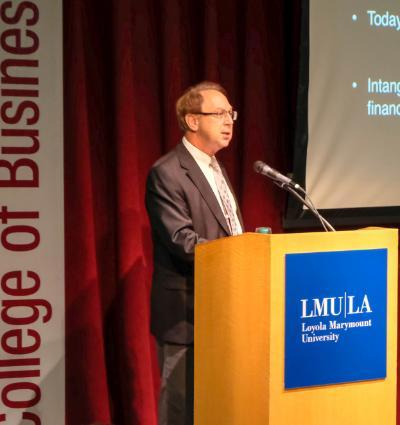
“Who other than accountants can save the planet?” asked Richard Kravitz of his Hilton Center for Business audience. Kravitz, editor in chief of the CPA Journal and managing director of content and publishing, said to the next generation of accountants, “You have a lot of work to do as accountants, as finance majors, as financial and risk managers and outside advisers to bring out the rich seams of value in a company.”
Kravitz’s lecture “The 10K and the Search for Meaning: Has Financial Reporting Lost Its Way?” was presented to a crowded Hilton Center for Business Auditorium on the Loyola Marymount University campus. He explored the details of financial reporting, and how a company establishes and maintains its value.
Kravitz looked at how financial capital and financial reporting became unhinged from the value or market capitalization of public companies. He also identified the largest economies of the world today as corporations, not sovereign nations, and how corporations mirror society and how society mirrors corporations. Kravitz also identified the rich streams of capital that lie outside of financial reporting and how institutional ownership has changed over the past 85 years.
He also revealed a myth that corporate finance books still perpetuate: the myth of shareholder ownership. Kravitz’s last point of his lecture covered manufactured capital in depth, its relation to hidden risk and the potential of value destruction down the supply chain.
Kravitz earned his B.A in economics and Spanish literature with honors, and his M.B.A from New York University. He has written more than 30 articles on ethics and corporate morality, financial fraud and social responsibility. Kravitz is a passionate observer of global corporate behavior through his visits with C-suite executives and board members around the world giving him insight into multinational corporations.
He emphasized that the way corporate entities are valued in the market today lies outside of the traditional boundary of financial accounting and financial reporting. Value is buried in sales and administrative expenses or costs of sales. “In simple terms, they are knowledge, data, information and ideas. These are the conceptual assets that are not measured, these are the dominant creators of value today and, in fact, the investment in non-financial assets or intangibles at $2 to 3 trillion a year, is now the dominant creator of corporate value.”
Kravitz then turned to the geopolitical and supply-chain issues. Inattention to supply-chain management is a greater risk than anything physically owned; it could cause more long-term value creation and more long-term value destruction than anything else. For example, Kravitz talked about iPhones. He suggested that if this generation decides that forced labor and underage workers and suicides by assembly workers who manufacture iPhones in China is no longer acceptable corporate behavior, what’s going to happen to Apple’s market capitalization? Incidentally, he added, more than 90 percent of the respondents from the World Economic Forum reported that supply-chain risks have taken a greater priority over the last couple of years.
Kravitz explained the importance of brand recognition. “It’s the Amazons, the Microsofts, the Ubers, the Lyfts, these are examples of companies with negligible balance sheets relative to market capitalization and reputation,” he said. “That means what the brand stands for, how it is perceived in the media and in social media, is one of the greatest creators of value, but also carries with it one of the greatest risks for value destruction.”
He took his audience along the history and future of the value of financial reporting, with the hope of challenging traditional beliefs and leading his audience to wonder, has financial reporting lost its way?
To view a recording of the lecture, click here.
Reporter Victoria Afchine is a senior English major.



